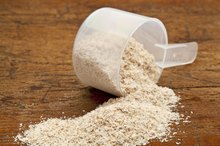What does fact checked mean?
At Healthfully, we strive to deliver objective content that is accurate and up-to-date. Our team periodically reviews articles in order to ensure content quality. The sources cited below consist of evidence from peer-reviewed journals, prominent medical organizations, academic associations, and government data.
The information contained on this site is for informational purposes only, and should not be used as a substitute for the advice of a professional health care provider. Please check with the appropriate physician regarding health questions and concerns. Although we strive to deliver accurate and up-to-date information, no guarantee to that effect is made.
Can Too Many Sugar-Free Items Affect Your Stomach?
Sugar-free foods are a way to enjoy sweet flavors without all the calories. If you rely on sugar-free foods often, however, you may suffer side effects. Sugar-free gum and candy as well as items labeled as dietetic may be of particular concern. Specific additives in these foods can cause digestive distress, especially in sensitive people.
If you are experiencing serious medical symptoms, seek emergency treatment immediately.
Sorbitol and Mannitol
Two additives commonly used as a sweetener in sugar-free gums, syrups, cake mixes and candies called sorbitol and mannitol produce a laxative effect in some people. Although sorbitol is naturally found in fruits, such as apples and peaches, it is more likely to cause a problem when used as a sweet sugar alcohol added to foods. Mannitol is another artificial sweetener derived from sugar alcohols used often in candy and gum. These additives have fewer calories than sugar and they pass through your system partially digested so you absorb even fewer calories.
- Two additives commonly used as a sweetener in sugar-free gums, syrups, cake mixes and candies called sorbitol and mannitol produce a laxative effect in some people.
- Although sorbitol is naturally found in fruits, such as apples and peaches, it is more likely to cause a problem when used as a sweet sugar alcohol added to foods.
Symptoms
What Causes Abdominal Bloating After Eating?
Learn More
Because sorbitol and mannitol are absorbed slowly, they linger in the gut. This causes gas and bloating in some people. In sensitive people, diarrhea, vomiting and nausea can occur with excessive consumption.
How Much
The Center for Science in the Public Interest reports that symptoms can occur from ingestion of between 10 g and 50 g of sorbitol daily 2. Because they weigh less, children may experience gastrointestinal symptoms with even lower amounts. The Food and Drug Administration requires manufacturers to warn that sorbitol may cause a laxative effect only if a product will result in the consumption of 50 g or more per day.
Strategy
Caffeine Withdrawal & Diarrhea
Learn More
Weaning yourself off sugar-free candies, gum and other products can help you determine if your digestive distress is due to artificial sweeteners 3. If you can eliminate all sugar-free products for a week, and your stomach problems go away, you may be able to establish a correlation. Try substituting naturally sweet foods, such as fruit, to satisfy your sweet cravings.
Related Articles
References
- Drugs.com: Mannitol Side Effects
- Center for Science in the Public Interest; News Room; Consumer Group Petitions FDA to Require "Diarrhea" Notice on Foods that Contain Sorbitol; September 1999
- Ask the Dietitian: Sugar and Artificial Sweeteners
- Sorbitol
- Sorbitol | C6H14O6 - PubChem
- Carbohydrate malabsorption in patients with non-specific abdominal complaints
- Sorbitol
- Sugar Substitutes: Mechanism, Availability, Current Use and Safety Concerns-An Update
- The use of sorbitol- and xylitol-sweetened chewing gum in caries control - PubMed
- CFR - Code of Federal Regulations Title 21
- Sorbitol-based osmotic diarrhea: Possible causes and mechanism of prevention investigated in rats
- Effects of olestra and sorbitol consumption on objective measures of diarrhea: impact of stool viscosity on common gastrointestinal symptoms - PubMed
- Medical Management of Constipation
- Sorbitol | C6H14O6 - PubChem
- Effects of Sweeteners on the Gut Microbiota: A Review of Experimental Studies and Clinical Trials
- Sorbitol
- Effects of Sweeteners on the Gut Microbiota: A Review of Experimental Studies and Clinical Trials
- CFR - Code of Federal Regulations Title 21
- Sorbitol-based osmotic diarrhea: Possible causes and mechanism of prevention investigated in rats
- Effects of Sweeteners on the Gut Microbiota: A Review of Experimental Studies and Clinical Trials
- Sodium Polystyrene Sulfonate Suspension, USP Sorbitol Free Rx Only
- Sugar substitutes during pregnancy
- A Systematic Review of the Effects of Polyols on Gastrointestinal Health and Irritable Bowel Syndrome
- Low-FODMAP Diet for Treatment of Irritable Bowel Syndrome
- Artificial sweeteners – a review
- Medical Management of Constipation
- FoodData Central
- FoodData Central
- Effects of an exopolysaccharide (kefiran) on lipids, blood pressure, blood glucose, and constipation - PubMed
- The effect of probiotics on functional constipation in adults: a systematic review and meta-analysis of randomized controlled trials - PubMed
- Castor oil induces laxation and uterus contraction via ricinoleic acid activating prostaglandin EP3 receptors
- Diets for Constipation
- Butyric acid in functional constipation
- Are Senna based laxatives safe when used as long term treatment for constipation in children? - PubMed
- Evaluation of the Nutritional and Metabolic Effects of Aloe vera - Herbal Medicine - NCBI Bookshelf
- Beneficial health properties of psyllium and approaches to improve its functionalities - PubMed
Writer Bio
Andrea Boldt has been in the fitness industry for more than 20 years. A personal trainer, run coach, group fitness instructor and master yoga teacher, she also holds certifications in holistic and fitness nutrition.









